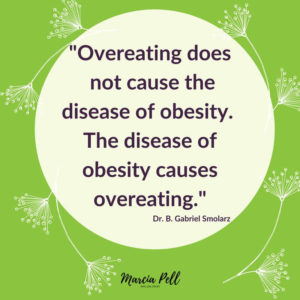Today I want to get some facts out on the important topic of obesity. Whether you yourself have weight issues, obesity, or know someone who does, it will help all of us to better understand obesity.
There’s a big misperception about obesity. Ignorance about this topic can be hurtful and cause real damage. I want people to know the truth.
So what’s this misunderstanding?
People think obesity is a character flaw.
 Many folks believe:
Many folks believe:
- Obesity is caused by taking in more calories than you burn up.
- That you just need to eat less and move more to lose weight.
- It’s about willpower.
- People with obesity must be lazy and ignorant if they cannot manage their weight.
All of the above are wrong!
Obesity is a complex disease.
Clinical endocrinologist, Dr. Gabriel Smolarz says, “Overeating does not cause the disease of obesity. The disease of obesity causes overeating.“
In a podcast, SoundbitesRD with Melissa Joy Dobbins, Smolarz explains the factors that cause the dysregulation of energy which leads to obesity. I love when experts can break down complex systems in a way that “every day people” can understand.
If you are interested in how the brain regulates our food intake and how problems with this system can lead to obesity, then I highly recommend this podcast episode. I got excited to share it because it is understandable and he gives great examples. He also has suggestions about what can be done about the problem.
Dr. Smolarz explains the complexity of appetite regulation. Three parts of the brain are involved in appetite regulation.
1. The Homeostatic part of the brain is the primitive section that regulates the things you need for survival. If this part gets a message that you are hungry, then you will be compelled to eat. Breathing is another function regulated in this part of the brain. When you were a child you may have discovered that can’t keep holding your breath as long as you like. That’s the primitive part of the brain compelling you to breathe.
2. The Hedonic part of the brain makes you feel good. You may eat because food tastes good or it makes you feel better if you’re stressed. We’ve all eaten because it makes us feel good. Think of dessert on Thanksgiving. I bet you weren’t hungry after dinner but when the pie was served you sure enjoyed it.
3. The Executive function part of the brain plans. Counting calories and following a meal plan are examples of executive functions. It is critical to understand that it is difficult for the executive function part of the brain to supersede the homeostatic and hedonic parts.
The disease of obesity happens when there is some type of “deep-seated electrical problem” according to Dr. Smolarz.
There are many hormones and feedback loops where things can go wrong. These hormones regulate whether one eats or doesn’t eat, feels full or doesn’t feel full. If there’s a problem with the hormones involving the primitive part of the brain, you may get the message that you are hungry even if you just ate. If that happens, you WILL eat.
It’s not a matter of willpower. And it’s not your fault.
- Do not blame and shame yourself or others.
- Understand that everyone is different. There’s not a one size fits all when it comes to weight.
Again, it’s complex and there are many types of obesity. In other words, there’s many different ways the dysregulation can occur in a faulty “electrical system”.
My wish is that one day soon there will be no stigma associated with obesity or diabetes.
I wish it was treated more like essential hypertension, another condition related to dysregulation. In essential hypertension the body creates blood pressure that is too high. People treated for this disease don’t face any stigma associated with it and therefore are not ashamed of their condition. People with hypertension get treated without feeling it is their fault they have this problem.
Recently, I felt like screaming when I saw a woman on social media respond to a post about this podcast.
She asserted the science isn’t true and that it really is just about calories in and calories out. She went on to say what works for her and that everyone just needs to do she did. It was a perfect example of bias, prejudice, and willful ignorance.
She ignored the fact that what works for some doesn’t work for all. I bet we all have examples of that fact. Each person is a puzzle with a unique solution. We have a long way to go to understand and develop more options to treat obesity. We apparently have just as far to go to eliminate prejudice and ignorance about it.
I hope you found this information helpful and will be more understanding and kind to yourself and others who have weight issues and obesity.
One more thing, the foundations of weight management remain solid, so everyone should:
- modify their calorie intake
- be physically active
- get plenty of quality sleep
If that isn’t enough there are other solutions, such as medications and surgery.
But remember, you do not need to do this alone.
Get the help you need it and don’t be afraid or ashamed to ask. YOU CAN DO IT, one step at a time!






Leave a Reply